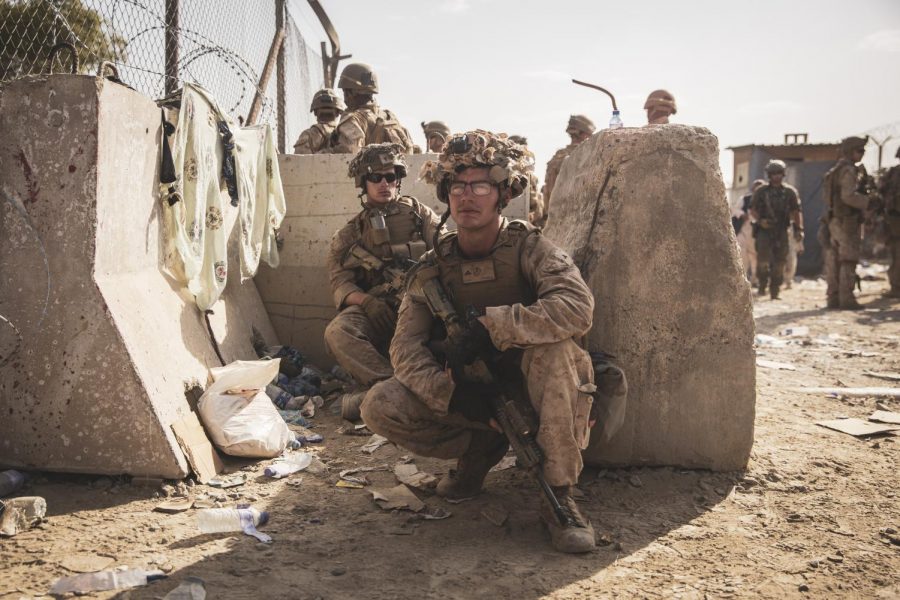Afghanistan: History Behind the Fight
The fight for human rights continues, even after the United States leaves
Photo provided with permission BY: U.S. Central Command Public Affairs
U.S. Marines with Special Purpose Marine Air-Ground Task Force – Crisis Response – Central Command, take a moment to rest during an evacuation at Hamid Karzai International Airport, Kabul Afghanistan, Aug. 21.
October 11, 2021
On Aug. 14, the Islamic extremist group, the Taliban, breached allied territory in Afghanistan with the intent to seize control of Kabul — the capital of Afghanistan. The Taliban has since assumed control of Afghanistan’s government as the ruling body and is seeking recognition by the United Nations.
On Aug. 30, General Kenneth F. McKenzie Jr. announced the evacuation of a total of over 123,000 civilians and all remaining U.S. troops from Afghanistan, ending the 20 year long War on Terror — the longest war in U.S. history.
What does the government takeover mean for Afghanistan’s citizens? Government teacher George Villanueva says it’s not good for the people of Afghanistan.
“For the people themselves, I think it’s nothing but bad news,” Villanueva said. “The Taliban … they’re not for the people. … human rights are going to continue to disintegrate in that region.”
Villanueva also says that while men may be unaffected by the new regime, women have virtually no rights.
“If men tow the line, and they adhere to the zealot beliefs of the Taliban, they’ll more than likely be fine, but women have absolutely no rights,” Villanueva said. “We’re not talking about they don’t have the right to vote, we’re talking about loss of life, physical and sexual assault … no education. …they are back to the stone age of ‘women are property.’”
However, World History teacher Catherine Eck says that the Taliban have done some good.
“I mean, they’re not all bad, they’ve built schools and mosques … mutual aid societies and things like that,” Eck said. “From a western perspective, they have done things that kind of go against our idea of civil society, but you have to look at it both ways.”
While the Taliban are not known for empathy on the battlefield, the U.S. is also no stranger to questionable actions during times of warfare, according to Eck.
“Yes, some of the things that they do to prisoners of war go against the Geneva convention,” Eck said. “The U.S. has also had some of its tactics questioned as war crimes, but the Taliban is definitely known for some extreme forms of violence when it comes to battle and people taken in battle.”
How we got here: 9/11’s Effect on U.S. policy on the War on Terror
How long has the U.S. been involved in foreign affairs? Eck says from the start.
“The U.S. has been involved in foreign affairs really since the founding,” Eck said. “We talked a lot about not being involved in other countries’ affairs, but you know, the U.S. relied on France to win the Revolution, so I mean it really goes back to the founding.”
Eck says that U.S. involvement in the Middle East ramped up in the 1960s.
It was only until the Sept. 11 terrorist attacks and President Bush announcing the War on Terror that U.S. activity in the Middle East was publicized, Eck says.
After the attacks, other countries came to the support of the U.S. publicly, but made little change overall, U.S. History teacher Greg Walker says.
“A few other countries, such as England, joined the U.S. in their fight against terrorism,” Walker said. “But for the most part, the remainder of the world made [no] change as they [had] been fighting this for years — long before the U.S. faced it.”
According to Eck, some of the support for the U.S. from the Middle East disappeared after the Iraq War.
“In the immediate aftermath of 9/11, most countries sort of rallied around the United States, and pledged support … and [that] they’re going to help us fight this war on terror,” Eck said. “And then President Bush says we’re going to invade Iraq because of [weapons of mass destruction], which really had nothing to do with 9/11, and that… turned some [public opinion] against the U.S. in the Middle East.”
The Taliban and the Mujahideen that the U.S. backed during the Soviet-Afghan War are one and the same.
“The Taliban [are] the former… fighters against the Soviets that were backed by the United States, and when the Soviets were driven out and a more western style government was put in Afghanistan, the Taliban saw that as… not keeping with their Islamic identities,” Eck said. “So they start to fight them for a more Islamic based rule of the country.”
Eck says the Taliban’s strict, extremist interpretation of the Quran was the reason they took issue with the new western government.
Moving forward: What happens now?
Was the American War on Terror successful? Walker says that depends on a person’s definition of success.
“Leaders of terrorist organizations were removed from power and those organizations suffered a [setback] in control of territory,” Walker said. “But it seems that success only created a new version of the same problem.”
Then what was the intention of the U.S. going into Afghanistan? Walker says that the answer is ambiguous.
“I honestly don’t know,” Walker said. “We would have [to] go research the purpose of U.S. involvement in the first place. Was it to establish a government of the Afghan people for democracy and human rights? If so, then the U.S. involvement failed.”
The U.S. has left some of its allies in Afghanistan during the evacuation, which Walker says has been paralleled with the Vietnam War.
“Historians and journalists have made connections to Vietnam and the U.S. leaving Saigon — literally leaving from one side of the city as the enemy is entering the other side,” Walker said. “Photos taken reflect that. The intention of both Vietnam and Afghanistan, I think, was to make the world safe for democracy — to quote Woodrow Wilson. And in both situations, the apparently smaller, weaker force prevailed.”
The future for the people of Afghanistan is not looking good, according to Villanueva.
“There are some people still fighting back, but I heard one person say, ‘We pray that the Taliban does the right thing,’” Villanueva said. “This has been going on for decades, for generations, so I expect more chaos, turmoil, loss of life — nothing good.”






